| Srl | Item |
| 1 |
ID:
106746
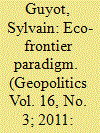

|
|
|
|
|
| Publication |
2011.
|
| Summary/Abstract |
There is a gap in the geographical/geopolitical literature about the process that motivates humans to conquer a boundless, timeless and invaluable wilderness in the name of plural ecologies to serve their own political interests in control and territory building by means of 'green gerrymandering'. The ecological frontier (or eco-frontier), a neologism produced by a contemporary greened civil society, can be considered a new paradigm that embraces the mental representations and spatial constructions of eco-conquest without restricting its temporal dimension to the present time. Indeed, the eco-frontier is a genealogical paradigm where new dynamics always revisit old processes. The creation and use of the eco-frontier can illuminate the history of the global territorialisation of nature in the last three centuries. From a spatial point of view, two main understandings of the eco-frontier exist. The first characterises virtual and mental imageries of natural spaces of eco-conquest that are strongly associated with Westernised representations of nature. The second considers eco-frontiers as geographical processes to understand the green dynamics of territorial appropriation and re-conquest. As a genealogical paradigm, the eco-frontier has a specific temporal dynamic that integrates the different historical contexts and political ideologies of nature. Three generations of eco-frontiers (Empire, Geopolitical and Global generations) began at different times and co-exist today, with superposition and percolation. This empirical study shows how contemporary environmentalists and green stakeholders produce specific discourses and representations on global eco-frontiers. The paper focuses on the current territorial domination carried out by contemporary eco-conquerors creating possible new geopolitics.
|
|
|
|
|
|
|
|
|
|
|
|
|
|
|
|
| 2 |
ID:
149071
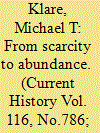

|
|
|
|
|
| Summary/Abstract |
The world is beginning to move away from reliance on fossil fuels altogether, rendering obsolete many of the strategic plans intended to ensure the safe flow of oil.
|
|
|
|
|
|
|
|
|
|
|
|
|
|
|
|
| 3 |
ID:
184624
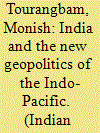

|
|
|
| 4 |
ID:
114963
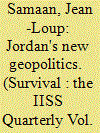

|
|
|
|
|
| Publication |
2012.
|
| Summary/Abstract |
With revolutions in Tunisia and Egypt, NATO's intervention against the Muammar Gadhafi regime in Libya and the unfolding civil war in Syria, the Kingdom of Jordan faces a dramatically altered strategic landscape. The kingdom has not been immune to the upheavals, having seen repeated protests since December 2010 on a scale not experienced for several decades.
|
|
|
|
|
|
|
|
|
|
|
|
|
|
|
|
| 5 |
ID:
133902
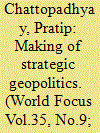

|
|
|
|
|
| Publication |
2014.
|
| Summary/Abstract |
Geopolitics as a subject has a trajectory from 'imperialist geopolitics' to 'new geopolitics' to 'critical geopolitics'. Contextualising Indo-Bangladesh relations since the post cold war period , particularly with the sensiticity of 'Gujral Doctrine' of 1996 within this 'geopolitical tradition', the paper shows that following Gujral, the NDA and UPA government have tried to project its benevolent image in its policy to Bangladesh, mostly in an one-way flow of assistance and aid, but badly wanting an assurance of 'zero-tolerance' to anti-Indian terrorist training camps in Bangladesh's soil.
|
|
|
|
|
|
|
|
|
|
|
|
|
|
|
|
| 6 |
ID:
149457
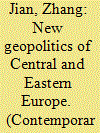

|
|
|
|
|
| Summary/Abstract |
Central and Eastern Europe is located between the East and the West. Big powers have traditionally competed for influence in the region and limited independence. After the Cold War, most of Central and Eastern Europe joined the EU and NATO and focused on political and economic transformations. Mostly these processes went smoothly and the region lost the world’s attention. However, in recent years, as Eurasian geopolitics has changed, especially after the outbreak of the Ukrainian Crisis, competition in the region has grown more intense. This situation is partly due to the region’s geography, history and development, which have traditionally made them targets for other powers to divide between them or to court favor. However, countries in the region no longer want to be puppets, they want to wrest control of their own destiny by playing the powers off against each other, so the geopolitical situation is now presenting a new picture.
|
|
|
|
|
|
|
|
|
|
|
|
|
|
|
|
| 7 |
ID:
176356


|
|
|
|
|
| Summary/Abstract |
The 2013 Arms Trade Treaty (ATT) sets international standards for the transfer of conventional weapons. The United States was heavily involved in the treaty’s negotiation, but has moved to the sidelines during the Trump administration, whereas China now engages more actively. In light of shifting balances of power and rising great power competition, these developments have several effects on the ATT and international cooperation regarding global arms transfers, eventually indicating a new phase of multilateralism in international security.
|
|
|
|
|
|
|
|
|
|
|
|
|
|
|
|
| 8 |
ID:
122077


|
|
|
| 9 |
ID:
158368


|
|
|
|
|
| Summary/Abstract |
Recent migration ‘crises’ raise important geopolitical questions. Who is ‘the migrant’ that contemporary politics are fixated on? How are answers to ‘who counts as a migrant’ changing? Who gets to do that counting, and under what circumstances? This forum responds to, as well as questions, the current saliency of migration by examining how categories of migration hold geopolitical significance—not only in how they are constructed and by whom, but also in how they are challenged and subverted. Furthermore, by examining how the very concepts of ‘migrant’ and ‘refugee’ are used in different contexts, and for a variety of purposes, it opens up critical questions about mobility, citizenship and the nation state. Collectively, these contributions aim to demonstrate how problematising migration and its categorisation can be a tool of enquiry into other phenomena and processes.
|
|
|
|
|
|
|
|
|
|
|
|
|
|
|
|